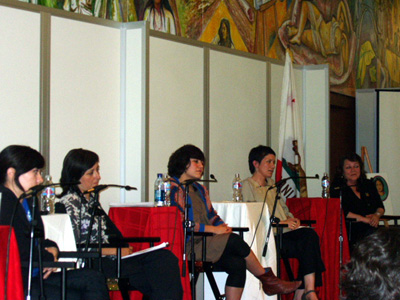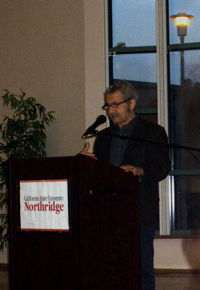This is a week of phantoms.
I shuttle back and forth, as always.
The hope is that in the oscillation is the key.
The movement over and through the space between, the resulting spiral, the avoidance of stagnation.
The ephemeral and the archive, the living and the dead, material and digital, spirit and electric spark.
“Hey man, you look like you’re gonna kill somebody tonight!”
“Yes, it’s hitman aesthetic. It’s the latest thing. It was this or emo.”
“Haha, right. Pobres emos. So anyway, when are you gonna be in here?”
“I am in here—right now. So are you. We’re all in here. On display. Performing. Conceptualizing. Installed. I am a preacherman assassin thumping an empty book, and you are that rabbit again running to catch up with the sun.”
This drunk guy tells me I that have to build my own bridges. It’s supposed to be some kind of humorous metaphor for my having to roll my own cigarette bummed from his friend, but there’s a very clear, sudden hostility in his voice, directed point blank at me. He makes the assumption that I don’t want to, or can’t, and never gives me the opportunity to explain that I usually roll my own, so it’s no big deal.
But that’s beside the point. I get where he’s coming from. He’s right, sort of. “Hey, but you know, it takes more than one person to build a bridge.”
I flick an ash on the crown of his big head.
The timing is a little off, but it’s okay. A punchline tab of LSD buried too deep in a double-breasted coat pocket. A photograph sandwiched between several living legends and adopted family members. Behind us, a wall of real history. I’m feeling nauseous, but in a good way.
Yeah, man.
High heels. Glitter make-up. Crazy two-inch eyelashes.
Silk ties. Sharkskin sideburns. Trimmed goatees.
Glamorous glyphs.
Lifestyles of the Chic and Fantastic.
“Hey man, didn’t that make you feel really good when he introduced us as his adopted sons?” my homeboy says to me later.
“Yeah, man,” I say. “But, you know, I think maybe you’re like an adopted son, but I’m more like, I don’t know, the problem foster kid with troubled, unknown origins that they keep around fifty percent hoping he’ll get his shit together, and fifty percent for the state check.”
We both laugh.
Can’t shake this cynicism. Can’t tell if it’s a real descent into the void, or just another mask.
The bridges burning, the humor darker and darker.
Tonight, I am in black and white reverse negative print.
I walk among my contemporaries feeling like a phantom.
Maybe my skin will always be too translucent for this scene.
I will never be fully trusted not to disappear completely. I will never fully trust myself.
Someone passes right through me. They stop, sensing that something is a little off. On some deep, indecipherable level, they are slightly shaken. The order of things has been upset.
But it’s a subtle, ephemeral thing. They blink, shake it off, and continue moving.
I tell myself that I must do the same. Blink. Shake it off. Continue moving.
Generate invisible opacity.
—but that’s not quite it.
I rewind and look more closely. I pause, slow-motion, zoom in, and suddenly I realize that I’m the one passing through them first.
Later, by the time I have forgotten the initial contact and come back around again, it should be no surprise that I have rendered myself invisible.
I am passing, passing, always passing.
In one scenario, they look back at this important moment and marvel at how we so effortlessly rendered ourselves invisible through a sophisticated technology of opaque materials and machinery and syntax that we utilized to position ourselves after the fact but before the friction.
Nobody got wet. Nobody sighed. No fluids/diseases were exchanged. No suave hellos or bittersweet goodbyes.
The white walls turned inside out to absorb us, and we all passed right through like graffiti dissolving itself into blankwall background.
At that point, maybe there was nothing left to deface but our own masks.
—is this simply documentation, acknowledgment, respect—or another kind of decoy crime scene in the (un)making?—
Some anointed themselves the future. Some froze themselves in the past. Some caught themselves up in the time lag, again.
All movement ceased around an accumulation of words and images.
All of it felt like an infinitely slow-grinding circle.
I stood in an endless inward toppling awkwardly on seven toes with one arm over my head and the other coolly bent at my side. Half my mouth was a crooked grin, the other twisted around a horrific snarl. One hand was casually placed in the pocket of my perfectly creased wrinkled slacks, the other dangled its gnarled fingers over the one wide-open eye with which I watched the world. Seventeen hairs on my head were carefully arranged out of place. One lens was missing from my glasses, but no one could tell which. The world was at once hopelessly blurred and sharply focused, inducing an acute nausea that I found both exhilarating and devastating. I saw double of everything, and I knew that I could take a risk and reach out for what might be real, might be a phantom, or I could remain motionless.
Or, I could just puke.

